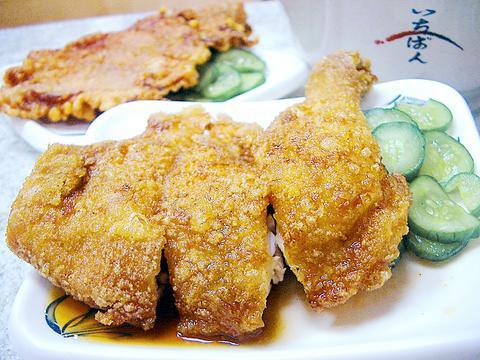For the past 60 years, Yu-lin has been a synonym for fried chicken legs and rice. Situated in a lane in Ximending near the ubiquitous teenage fashion stores, Yu-lin reveals the deep traces of time. The exterior looks just like it did 60 years ago and the delicious taste of fried chicken remains the same.
Third-generation owner Wu Hsin-hui (

PHOTO: YU SEN-LUN, TAIPEI TIMES
When they come out of the frying basket, Yu-lin's chicken legs look as if they're wearing a shiny golden armor, which preserves the juiciness and freshness of the meat. When served, the legs are sprinkled with dark soy sauce and garnished with cucumber slices. With one big bite of the leg, you can enjoy a mixture of crispness, juicy meat and the sweet and sour tastes of the sauce.
Compared with Western fried chicken at fast-food chains, the coating is thinner but equally crispy. To my surprise, after 30 minutes talking with Wu, the cold chicken in front of me still tasted crispy and non-greasy. Wu said the thin coating kept out the grease.
The secret of Yu-lin chicken is the coating of seasoned flour and spices. "Just dip the chicken leg in the mix and you don't need to marinate the meat with any sauce before frying," Wu said.
In the 1970s a well-known food production corporation offered NT$60 million to buy the secret ingredient in Wu's chicken coating, but was rejected. A Japanese food production company even came to Taipei and sent the mix back to the labs to analyze it. The Wu family was even invited to South Korea to fry chicken for its ambassador, as the ambassador frequently used to dine at Yu-lin when he was posted in Taipei.
Now, the Yu-lin fried chicken mix is supplied to more than a dozen fried chicken or spare-rib food chains in Taiwan, including some well-known resort hotels. A small pack (600g) mix can also be purchased here. A lot of Yu-lin's old customers say they cannot forget the taste of its chicken legs long after they emigrate, so Wu sells them the mix. "This is a service to our old guests," he said.
Apart from fried chicken legs and rice or noodles (NT$100), there is also fried spare-rib rice or noodles (NT$90), and fried fish and rice to choose from. The fried tofu (NT$40) is also tasty.

June 9 to June 15 A photo of two men riding trendy high-wheel Penny-Farthing bicycles past a Qing Dynasty gate aptly captures the essence of Taipei in 1897 — a newly colonized city on the cusp of great change. The Japanese began making significant modifications to the cityscape in 1899, tearing down Qing-era structures, widening boulevards and installing Western-style infrastructure and buildings. The photographer, Minosuke Imamura, only spent a year in Taiwan as a cartographer for the governor-general’s office, but he left behind a treasure trove of 130 images showing life at the onset of Japanese rule, spanning July 1897 to

One of the most important gripes that Taiwanese have about the Democratic Progressive Party (DPP) is that it has failed to deliver concretely on higher wages, housing prices and other bread-and-butter issues. The parallel complaint is that the DPP cares only about glamor issues, such as removing markers of Chinese Nationalist Party (KMT) colonialism by renaming them, or what the KMT codes as “de-Sinification.” Once again, as a critical election looms, the DPP is presenting evidence for that charge. The KMT was quick to jump on the recent proposal of the Ministry of the Interior (MOI) to rename roads that symbolize

On the evening of June 1, Control Yuan Secretary-General Lee Chun-yi (李俊俋) apologized and resigned in disgrace. His crime was instructing his driver to use a Control Yuan vehicle to transport his dog to a pet grooming salon. The Control Yuan is the government branch that investigates, audits and impeaches government officials for, among other things, misuse of government funds, so his misuse of a government vehicle was highly inappropriate. If this story were told to anyone living in the golden era of swaggering gangsters, flashy nouveau riche businessmen, and corrupt “black gold” politics of the 1980s and 1990s, they would have laughed.

In an interview posted online by United Daily News (UDN) on May 26, current Chinese Nationalist Party (KMT) Chairman Eric Chu (朱立倫) was asked about Taichung Mayor Lu Shiow-yen (盧秀燕) replacing him as party chair. Though not yet officially running, by the customs of Taiwan politics, Lu has been signalling she is both running for party chair and to be the party’s 2028 presidential candidate. She told an international media outlet that she was considering a run. She also gave a speech in Keelung on national priorities and foreign affairs. For details, see the May 23 edition of this column,